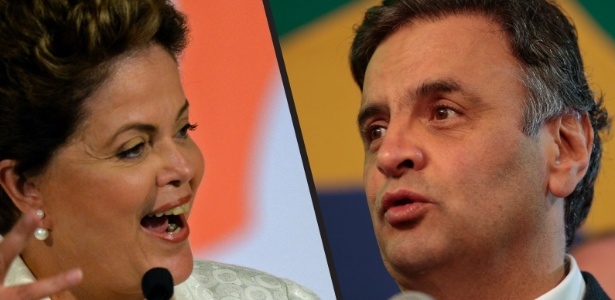 |
| Dilma Roussef and Aécio Neves |
Brazilian incumbent Dilma Rousseff, Worker's Party candidate running for re-election, is set to face a run-off against senator Aecio Neves, of the Brazilian Social Democracy Party.
Brazil's general election was held last Sunday, on October 5, with more than 142 million citizens casting their ballots. The country's voting system is all electronic and is likely to quickly deliver the result, within three hours after the voting ended.
Preliminary results of the first round voting, with 100 percent of the votes counted, indicated that Dilma Rousseff had received about 41.5 percent of the vote ahead of centrist Aecio Neves had got 33.5 percent.
Not only have Brazilians voted for president but also for the National Congress, state governors and state legislatures. And if no candidates in the presidential and gubernatorial elections received more than 50 percent of the vote, a second-round run-off will be held on October 26.
Presidential race
Historically, the left-right battle between the nation's two biggest parties, Worker's Party and Brazilian Social Democracy Party, is a disappointment to those who had hoped for change in the form of former environment minister Marina Silva, of the Brazilian Socialist Party who led the polls at one stage, as her speech was against polarization of the other two parties.
Historically, the left-right battle between the nation's two biggest parties, Worker's Party and Brazilian Social Democracy Party, is a disappointment to those who had hoped for change in the form of former environment minister Marina Silva, of the Brazilian Socialist Party who led the polls at one stage, as her speech was against polarization of the other two parties.
Ms Silva, a prominent environmentalist who had recently led opinion polls but saw her support collapse late in the campaign, surged in the polls in mid-August, after being catapulted from running-mate to the top of the Brazilian Socialist Party (PSB) ticket following an airplane crash that killed the party's leader and candidate, Eduardo Campos on August 13 (read more in the link).
The popular former green activist almost immediately caught up with Ms Rousseff in first-round polling and opened up a ten-point lead in the run-off, standing at second place in the opinion poll, right behind Ms Rousseff. By the beginning of September, Ms Silva was even confirmed the possibility of a technical tie between exiting President Dilma Rousseff.
At the time Mr Neves, until then Ms Rousseff's putative challenger, dismissed Ms Silva's surge as "a passing wave". For weeks it kept rolling. But then Ms Silva got caught in between two breakwaters.
Mr Neves, a successful former state governor, charged that she had been a member of the ruling Workers' Party (PT) for 25 years before she quit, too much like Ms Rousseff to ensure meaningful change. Although Ms Silva's orthodox policies to revive Brazil's sluggish economy sound nearly identical to his, Mr Neves pointed out that, unlike him, she lacks seasoned technocrats to implement them.
At the same time Mr Neves, whose hope of making it into the second round looked forlorn, stepped up a gear. For the first time, he was narrowly ahead of Ms Silva, according to Datafolha opinion poll published last Thursday (02).
In the second round, TV and radio time is split equally between the first-round winner and runner-up. Dilma Rousseff and Aécio Neves will be given twice a day 10 minutes each to air their advertising.
Nenhum comentário:
Postar um comentário
deixe seu comentário! faça valer sua opinião.